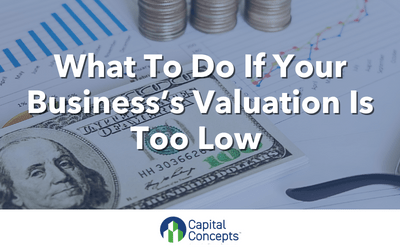We get it if you think predictable sales processes sounds like something too good to be true. Many business owners lack a background in sales, and thus they really don’t understand how it works.
At Capital Concepts USA, we know that building these processes is critical to grow your business and increase both its value and its performance. We assess all new clients’ sales processes, as it’s very common for this function to fall primarily on the business owner. Scaling up requires building a sales team, and we can help you do it.
Sales is both art and math. We’ll talk about math first.
When you look at the numbers, generating sales is a relatively simple math equation. Answer the following questions:
- Who is my ideal customer? Define them as specifically as possible.
- What is my average sale amount per product or service sold?
- What is my goal for sales revenue?
- How many sales do I need to hit that goal, using the average sale amount?
- How many interactions does it take for a person to:
✔️become a lead,
✔️have a sales conversation,
✔️request a proposal, and
✔️decide to buy?
Now you have a formula that tells you how many conversations you need to have to hit your revenue goals.
Where most people go wrong with the math is failing to accurately identify their target customer. Not everyone is ideal for you. When you’re small and every sale is important, it’s really hard to say no. However, successful salespeople learn that it’s more efficient and successful to focus only on the ideal target customer.
Once you’ve calculated your numbers, now it’s time to have those conversations and close those sales. This is where the art comes in. It won’t work to simply hire someone with a great personality and send them out to sell. They need to follow a process to schedule those conversations with the right people (see above about identifying your ideal customer), and they need to persist until they get a clear yes or no.
The Art of Effective Sales Follow-Up: Don’t Miss Out on Opportunities by Giving Up Too Soon
Common mistakes salespeople make include dropping a conversation after one or two “touches” and failing to follow up. Just because you hear nothing back after reaching out to someone once doesn’t mean they’re uninterested. Sometimes, depending on the product or service and industry, you may need to make 10-15 or even more “touches” to get a person to respond. People are busy, they use different communication methods (like text, email, DM, phone call), and you need to keep checking in.
Many salespeople also drop the ball after having an initial sales conversation or sending a proposal. Good salespeople follow up and follow through to close a deal. It isn’t harassing for a person to check back after sending a proposal, etc. Experts have good language to use in those follow-up messages and they know not to stop until they receive a clear yes or no.
If you recognize this as a need in your business, contact us today to see if our team is a good fit. We have experienced sales coaches who can work with you to document a predictable sales process, train your sales team, recommend strategies and software, and coach the team as they get up and running.
Read more articles on our blog, Capital Concepts Insights. We share stories and perspective on building successful businesses and planning successful exits.
Related Articles
Five Ways Financial Management Improves Your Business’s Value
Poor financial management can manifest itself in many ways, but the price is always the same: the value of your business.
Odds are, as the owner of your business you are a strategist, visionary, and leader. But you likely don’t have the bandwidth to manage the complexities of your business’s finances.
But not to worry! We’ve outlined 5 ways financial management will improve your business’s value.
How To Avoid the Biggest Valuation Mistake Made by Business Owners
You’ve been working on the sale of your business for months now. All the work, not just to complete this sale but to build a business someone else actually wants to buy, is about to pay off.
You hold your breath as the sales agent slides a piece of paper across the desk towards you…with a number completely different than you’d negotiated!
“As you know, we did a final business valuation last week to determine the final sale price for the closing today,” she explains. “After reviewing all of your records, we have determined that the value decreased from our initial estimate a year ago. As a result, the sale price will be 25% lower than we originally planned.”
What happened to the profitable sale you worked so hard for?!
What To Do If Your Business’s Valuation Is Too Low
You’ve decided to create an exit plan, and now it’s time to find out how much your business is worth. What if the value comes in lower than you expected? In this week’s Insights article, we talk about common issues that contribute to a low business valuation and how to move forward.
Need Fresh Eyes On Your Business?
We offer complementary consultations to help you identify the areas where you could most quickly and easily improve your business’s performance, value, and profitability. Request one today.




0 Comments